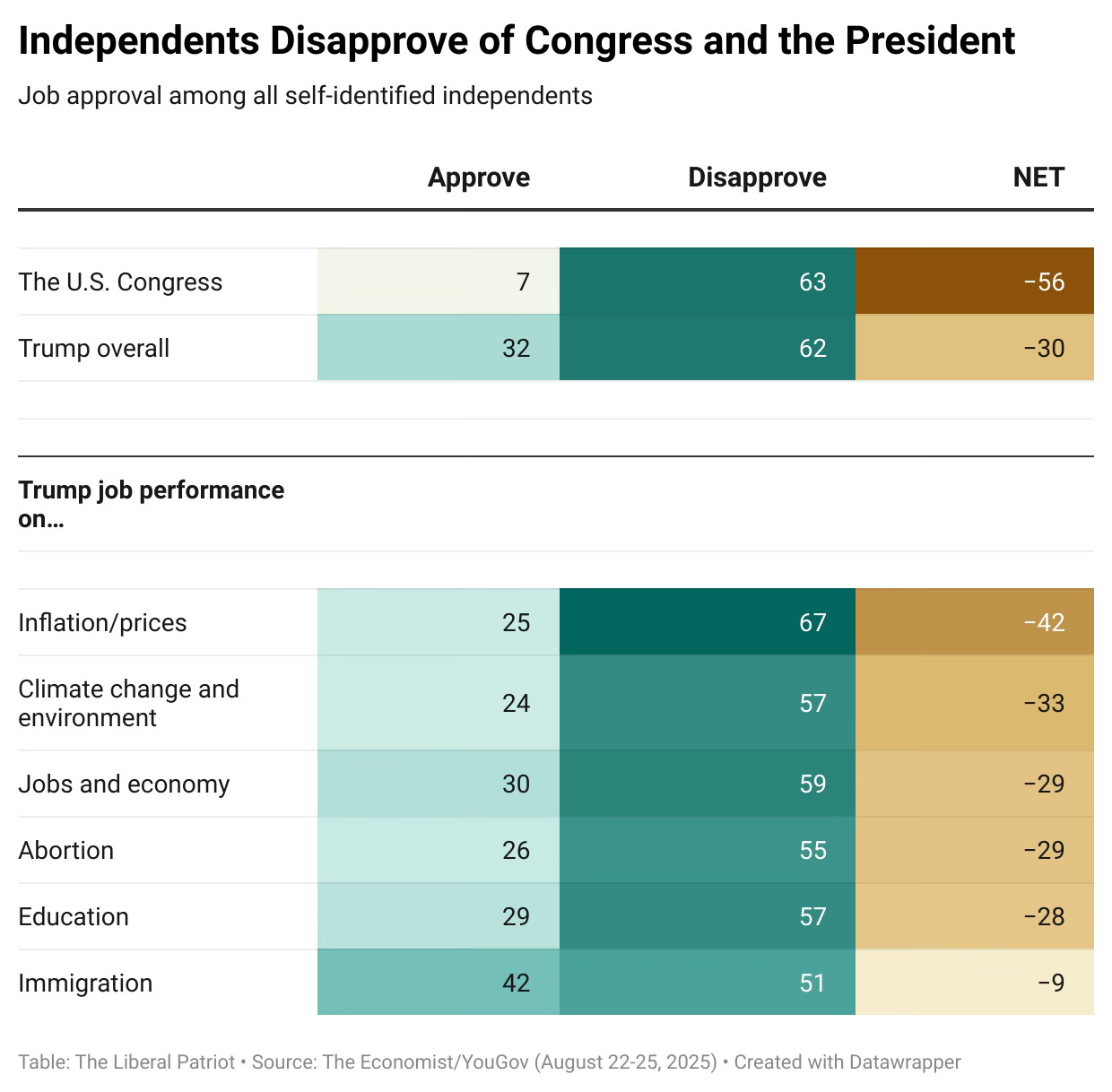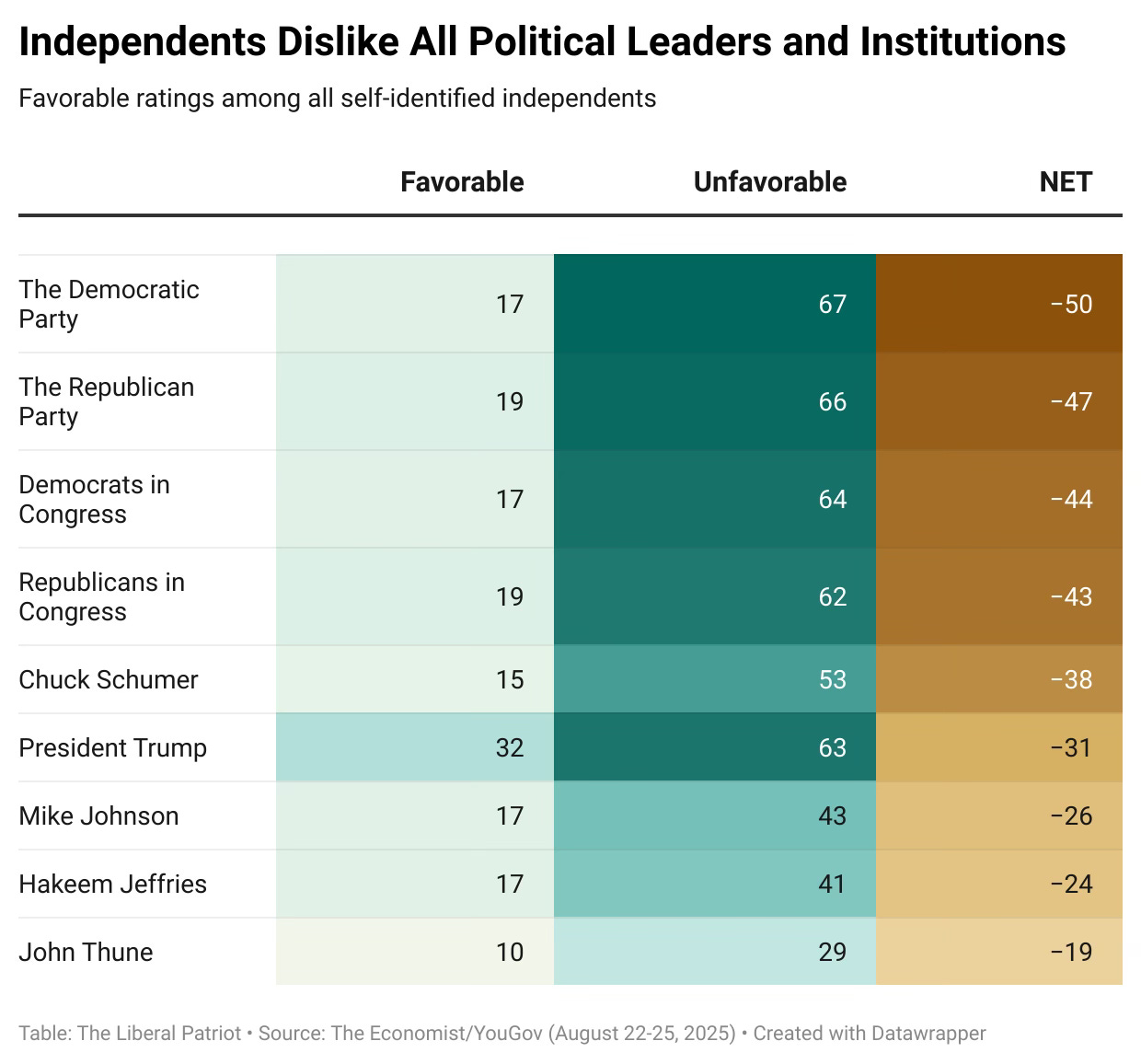Independents Are Done—With Everyone
Decent Americans in the middle can only take so much political dysfunction and poor governance before they snap.
The end of summer in the first year of a new term is the graveyard of American presidencies. Joe Biden’s popularity plunged by the end of August 2021 after the botched withdrawal from Afghanistan and ongoing party fights over spending priorities, and he never recovered. Likewise, Donald Trump’s approval was basically underwater throughout his entire first term and is headed that way in his second. After starting out with relatively even ratings among voters overall and basic support for many of his goals on immigration, crime, and inflation, President Trump has since squandered his remaining political capital with Americans in pursuit of a peculiar mix of economic and trade policies that aren’t helping with jobs or high costs for families, plus his usual mashup of bombastic political statements and personal pique against enemies that turns off many Americans.
Thus, the Trump show, like Biden’s before, is essentially over in the minds of most American voters—particularly among the critical bloc of independents who increasingly determine national elections. After splitting independents nationally in 2024, 48 percent to 48 percent, according to Pew’s validated voter study, Trump started out his second term in a decent spot with high forties job approval among independents, which has since dropped into the twenties and thirties by the end of this summer.
This is not a particularly good position for any incumbent party. Trump and the GOP’s saving grace, however, is the feckless Democrats, who are equally despised by many political independents.
Looking at new data from The Economist/YouGov, more than six in ten self-identified independents currently disapprove of the job performance from both the U.S. Congress and President Trump. The president only looks slightly better in comparison to the legislature since the net job approval of Congress (approve minus disapprove) is an abysmal -56 percent, while his sits at -30 percent.
Digging deeper into Trump’s handling of specific issues, political independents disapprove of Trump’s performance across the board, with the greatest disappointment on inflation and prices at -42 percent net approval and a more respectable -9 percent net approval on immigration, his strongest issue.
Normally, these numbers among independents—plus the extremely close margins in the House—would spark alarm among the incumbent party ahead of midterms. However, independent voters now dislike Democrats as much as, and often more than, they dislike Trump and Republicans throwing a wrench into things. Looking at the table below, you’ll see that net favorability ratings for Democrats (favorable minus unfavorable) stand at -50 percent with independents and at -47 percent for Republicans, with Democrats in Congress at -44 percent and Republicans in Congress at -43 percent. Likewise, Senate Democratic leader Chuck Schumer has a worse net favorability rating among independents (-38 percent) than does President Trump (-31 percent), while House Speaker Mike Johnson does slightly worse than House Minority Leader Hakeem Jeffries in the negative popularity contest (-26 percent to -24 percent, respectively).
Truly “a pox on both your houses” situation.
What does all this tell us? Independents are fed up with America’s two political parties and their leaders. They don’t like the direction Trump is taking the country, but they also don’t like the alternative, or non-alternative, offered up by Democrats.
Both parties seem content to ignore the opinions of independents. Democrats would probably be happy if independents didn’t vote in 2026 since they seem to do best in low-turnout, highly partisan environments. Republicans likewise would be fine to see many independents disappear next year given their poor ratings with these voters ahead of what is typically a referendum on the incumbent party. (Democrats currently hold a slight lead among independents on the generic congressional ballot in The Economist/YouGov survey, 30 percent to 22 percent, with 23 percent undecided and 23 percent planning not to vote.)
But looking ahead to the 2028 presidential election, which will be the first without Donald Trump on the ballot after three consecutive cycles, neither Democrats nor Republicans can afford to blow off disgruntled independents. These voters are too much of a wild card to ignore in an Electoral College battle, so the parties should at least offer up fresh voices and agenda items that might appeal widely to independents and address their priorities on economic and social issues rather than continuing to cater to their own extreme ideological base voters.
The likelihood of this happening seems remote given incentives within the two parties, so independents will have to flex their muscles in other ways—perhaps staging a revolt against both parties and their leaders, supporting third-party candidates and electoral reforms, focusing on non-partisan, cross-ideological policy movements like “Abundance” to help fix the country’s economy, working on state and local issues, or tuning out of elections and politics indefinitely.
The pipes in America’s two-party political system can only take so much pressure before they burst and must be replaced. When it happens, independents will almost certainly be the ones to fix the system—or change it altogether.






Following that last link I think Abundance should rename itself the wealthy highly educated political hobbyist party and call it a day. The Ezra Klein, Matt Yglesias brand of centrism. Cool tech to ride above the unwashed while being served exotic teas with school loan forgiveness for all.
Seymour Midwest is a great American brand selling most any long handled tool with a wooden handle. Pitchforks for instance.
Great article, but it is not just US Independents. The natives are restless all over the West, and then some. In Japan, the PM resigned within 48 hours of the French PM's resignation. Macron, is a political dead man walking, but has vowed to stave off Le Pen or her young disciple, at least until he sees a guillotine.
England, whose empire was once so vast the sun never sat on all British soil at once, recently went thru 5 PMs in 6 years, a couple of PMs ago. Newly elected Kir Starmer, may also have the political life expectancy of a fruit fly. Once unthinkable, it seems Nigal Farage's UK Reform might not even have to wait for the end of the decade, for their turn at power.
Even the perpetually well behaved and stoic Germans, loathe to air their dirty laundry in public, were recently informed by their new Chancellor their safety net, long the envy of the world, is collapsing. This, as Germans begin a 3rd year of recession, after playing the EU's rich Uncle for a quarter of a century. The Israelis just pushed all their chips into the middle of the table, when they bombed US alley Qatar, looking to exterminate Hamas leaders. And it appears, NYC , the financial capitol of the world, will elect a Communist in the next 60 days.
There are others, but Americans should understand, rarely has the phrase "global cluster f&$k" been more apropos, in the last 80 years. 4 years of unusually weak US leadership, coupled with the mass failure of Progressive rule, and much of the civilized West, the glue that holds the planet together, feels as if it is one heinous crime away from a slow burn evolving into rolling explosions. Something is going to give, and Mr. Nock is right, it is likely to be good for pitchfork sales.